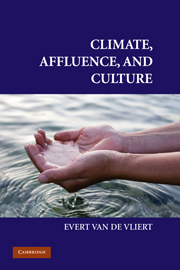Book contents
3 - Cash Compensates for Climate
from PART TWO - CLIMATE, CASH, AND WORK
Published online by Cambridge University Press: 21 August 2009
Summary
The worst line ever written is the poverty line of the World Bank.
Poverty is painful, especially in regions where money is needed to cope with extreme cold or heat. Poor Soviet successor states in cold continental climates such as Belarus, Russia, and Ukraine are cases in point. Even more noteworthy, in a hot belt several thousand kilometers in width encircling the earth at the equator, more lower income countries can be found than anywhere else. That belt of painful poverty has come to be known among economists as the equatorial grand canyon (Parker, 2000; Theil & Galvez, 1995; Williamson & Moss, 1993). At the rock bottom of the economic grand canyon, Mali, Niger, Chad, Congo, Sudan, Ethiopia, and Somalia are notorious for their famines, plagues, and ethnic clashes. The triad of cold or heat, poverty, and misery highlights the relevance of the following rhetorical question: Do money resources influence the relation between climatic demands and culturally embedded life satisfaction?
The findings reported in Chapter 2 leave room for two coordinated influences of climate and cash on life satisfaction. The first possibility is that colder winters, hotter summers, or both, produce lower incomes which in turn produce lower happiness ratings and higher suicide rates (see the dotted lines with arrows labeled Chapter 3 in Figure 1.1 on page 8). In the section “A Climate-Cash-Satisfaction Path?” the degree of temperateness versus harshness of a country's climate is related to the inhabitants' income per head.
- Type
- Chapter
- Information
- Climate, Affluence, and Culture , pp. 57 - 83Publisher: Cambridge University PressPrint publication year: 2008

